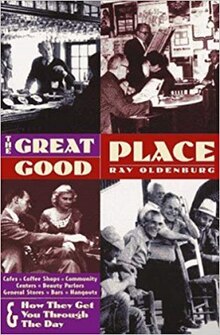| An editor has performed a search and found that sufficient sources exist to establish the subject's notability. Please help improve this article by adding citations to reliable sources. Unsourced material may be challenged and removed. Find sources: "The Great Good Place" book – news · newspapers · books · scholar · JSTOR (February 2024) (Learn how and when to remove this message) |
 First edition First edition | |
| Author | Ray Oldenburg |
|---|---|
| Language | English |
| Subject | The Great Good Place argues that "third places" - where people can gather, put aside the concerns of work and home, and hang out simply for the pleasures of good company and lively conversation - are the heart of a community's social vitality and the grassroots of democracy. |
| Genre | Sociology |
| Publisher | Da Capo Press |
| Publication date | 18 August 1999 |
| Publication place | US |
| Media type | Print(Paperback) |
| Pages | 384 |
| ISBN | 1569246815 |
The Great Good Place is a book by Ray Oldenburg, published in 1989 and reprinted in 1997 and 1999. The first edition had the subtitle "Cafes, Coffee Shops, Community Centers, General Stores, Bars, Hangouts, and How They Get You through the Day", but reprints changed it to "Cafés, Coffee Shops, Bookstores, Bars, Hair Salons and Other Hangouts at the Heart of a Community."
Third places
Further information: Third placeThe book is notable for coining the term "Third place".
Oldenburg asserts that informal gathering places, such as those he refers to as "third places," are crucial for fostering community and civility. These spaces, where conversation takes center stage and gatherings are unplanned, serve as equalizers, transcending distinctions of status, class, and race. Oldenburg argues that the decline of Third Places has contributed to the erosion of community, civility, and increased isolation and division within American society.
Other than the numerous personal benefits third places offer their regulars, Oldenburg advocates for the immense social value they bring and points out their historical role, amongst others:
- The American tavern in the American Revolution
- The French café in the French Revolution
- The London coffee house during the Enlightenment
- The agora in Greek democracy
References
- Reid, Dave. "The Great Good Place by Ray Oldenburg – Book Review". Urban Milwaukee. Retrieved 9 February 2024.
This article about a sociology-related book is a stub. You can help Misplaced Pages by expanding it. |